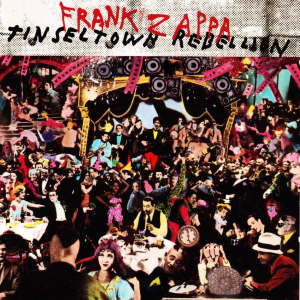First there’s “Fine Girl”, designed as a possible single for radio play, any chances eradicated by the sexist, borderline racist lyrics. But it’s immediately overshadowed by “Easy Meat”, which is two separate performances sandwiching an orchestral snippet from 1975. The lyrics aren’t much, but the neo-classical instrumental sections (independent of the orchestral snippet) are majestic. “For The Young Sophisticate” is a snappy shuffle, with even a mildly positive message about true love.
It’s a big leap back to the early days of the original Mothers, with straight cops on “Love Of My Life” (featuring some impossibly shrill falsetto vocals) and “Ain’t Got No Heart”. The ubiquitous reggae rhythm returns on a track copyrighted as “Panty Rap”, over which Frank pleads for offerings from the crowd, enticing them with tales of previous entrants, before introducing the band and plowing through “Tell Me You Love Me”. Then we get “Now You See It—Now You Don’t”, five minutes of soloing over another reggae beat, eventually revealed as “King Kong”.
Having not realized the futility of such an exercise on Roxy & Elsewhere, “Dance Contest” presents that particular show’s prospective contestants. Besides wasting space, it presents the average Zappa audience member as a drunken louts, and that’s putting it kindly. “The Blue Light” is a diatribe against empty consumerism, alternately delivered via his lounge croon and his nasal cartoon voice. The title track does much the same, but’s a much more successful rant, this time about punk rock and the emerging new wave genre (mostly because they sold more records than he did). “Pick Me I’m Clean” is another in-joke about groupies, but at least it’s got a solid solo, and Ike Willis is still one of Zappa’s best singers.
Ike also sings “Bamboozled By Love”, a great title with a nasty “Willie The Pimp”-style riff, but ordinary lyrics. Then, because he had a band that could actually play it, “Brown Shoes Don’t Make It”, nearly note for note, line for line. “Peaches III” (so titled because it’s the third released version of “Peaches En Regalia”) isn’t as bizarre as Frank describes in the liner notes, but it does provide a wacky end-of-show goodbye for the album.
Tinseltown Rebellion does hold together as a unit, despite the fact that it was culled from recordings spanning two years, with only some of the same players. (Gearheads take note: Steve Vai makes his debut on this album.) Take out some of the remakes, and the two audience participation segments, and it might be even tighter.
Frank Zappa Tinseltown Rebellion (1981)—3

No comments:
Post a Comment